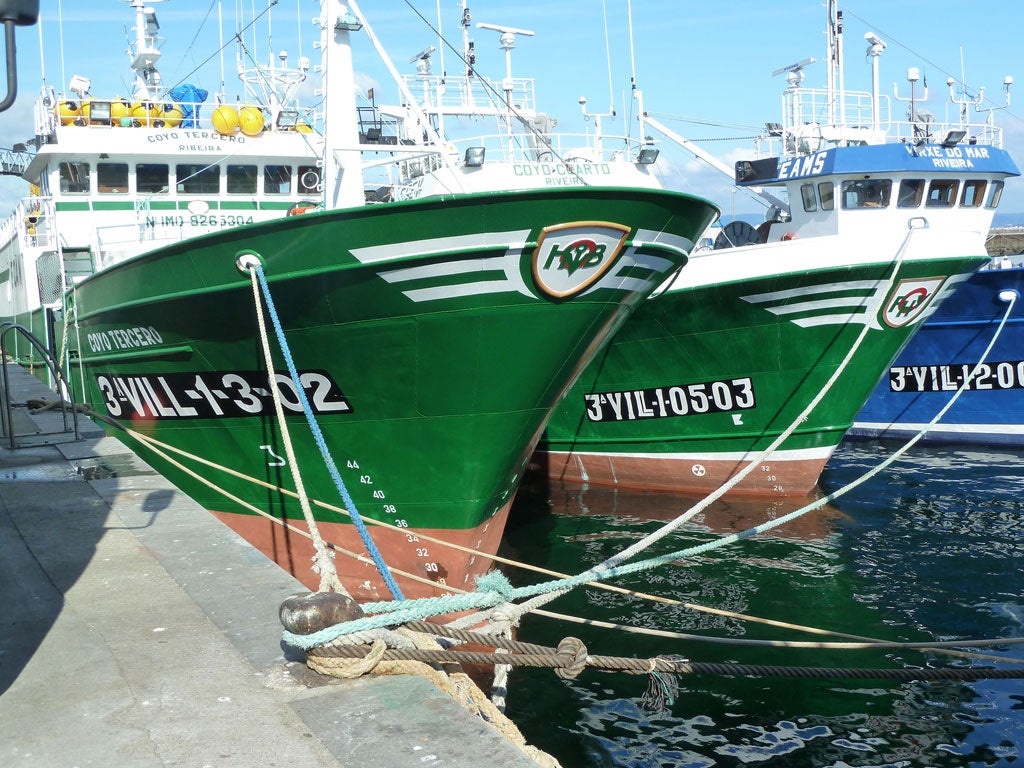Spanish fleet accused of law-breaking lands massive EU subsidies
Greenpeace urges Commission to end 'corrupted' fisheries policy

Spanish fishermen suspected of landing illegal catches are receiving multimillion-euro payouts from European Union taxpayers, according to a Greenpeace report published today.
In one case alone, European Commission (EC) officials are investigating subsidy payments to a group of companies affiliated to the Vidal family, from Galicia, which are thought to have received more than €15m in subsidies between 2002 and 2009, part of which come from the European Fisheries Fund (EEF), to which the UK contributes.
Companies connected to the family continue to receive subsidies despite alleged links to repeated incidents of illegal fishing. The report says at least seven of the vessels have been convicted for offences, including fishing without a licence, falsifying information and obstructing inspections.
The commission is also looking at how more than €€6m of subsidies given to Biomega Nutrición, a fish-oil factory, was used. The company, which has yet to open its factory, was originally registered to Manuel Antonio Vidal Pego, believed to be the head of the family, but has since changed its records. A factory spokesman denied any involvement with Vidal Pego when questioned by The Independent on Sunday.
Vidal Pego was convicted by US authorities in 2006 for smuggling illegally caught Patagonian toothfish. He and his father, Antonio Vidal Suárez, have stakes in a range of companies based in Spain, South America and Africa. The five Spanish companies that received subsidies are all thought to be run by members of Vidal Pego's family, including his father and two uncles.
One Cornish vessel, allegedly linked to the family, was indicted in the UK for having illegally fished shark fins, worth more than £1m, last year.
The report will add pressure to the much-criticised Common Fisheries Policy (CFP), which regulates European fishing. The EC is considering a massive reform of the CFP. Britain contributes approximately €110m per year to European Fisheries Policies, with a significant amount of that going towards subsidies.
Ariana Densham, a Greenpeace oceans campaigner, who led the nine-month report, described the system as "broken". "According to some estimates, up to 49 per cent of the global catch is illegal, unreported and unregulated, and this is one of the main reasons why our fisheries are in such rapid decline.
"The fact that in Europe this theft of fish is being subsidised by taxpayers' money, that we're paying pirates to steal our fish, destroy one of our oldest industries and devastate the marine environment, shows just how corrupted the CFP is," she said.
The Spanish fleet is more than twice the size of the UK's and will have received more than €1bn in subsidies between 2007 and 2013 – the EU's largest. Greenpeace claims Spain "systematically" fails to report illegal fishing and continues to fund convicted companies, yet still enjoys a privileged position at European level.
European fish stocks are dangerously threatened, the commission says, with three out of four species described as overfished, including 82 per cent of Mediterranean stocks and 63 per cent of the Atlantic's. The EU fleet catches two to three times more fish than is sustainable, and suggested reforms to the CFP, announced in July, focus on ensuring all stocks are at "sustainable levels" by 2015. Illegal fishing is considered one of the most serious threats to fish stock management.
A "serious fraud investigation" is being carried out into the Vidal fleet by the EU Fisheries Commission. Maria Damanaki, the European Commissioner for Maritime Affairs and Fisheries, said: "The serious allegations are already under investigation and being followed up with the Spanish authorities. We are establishing all facts to pursue any breaches."
The UK fisheries minister, Richard Benyon, said: "Illegal fishing is putting British fishermen at a competitive disadvantage and could be disastrous for our oceans. That's why the UK is leading the fight to clamp down on illegal fishing and overhaul the broken and wasteful quota system."
The IoS attempted to contacted all five of the firms linked to the Vidal family but none responded.
Join our commenting forum
Join thought-provoking conversations, follow other Independent readers and see their replies
Comments
Bookmark popover
Removed from bookmarks